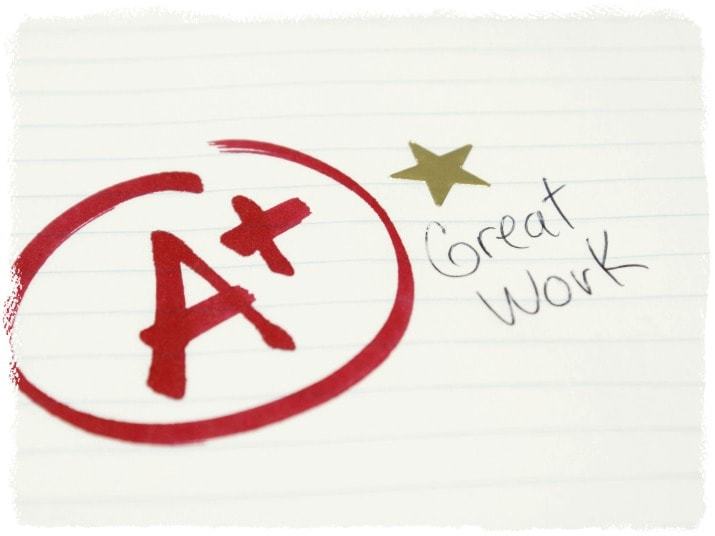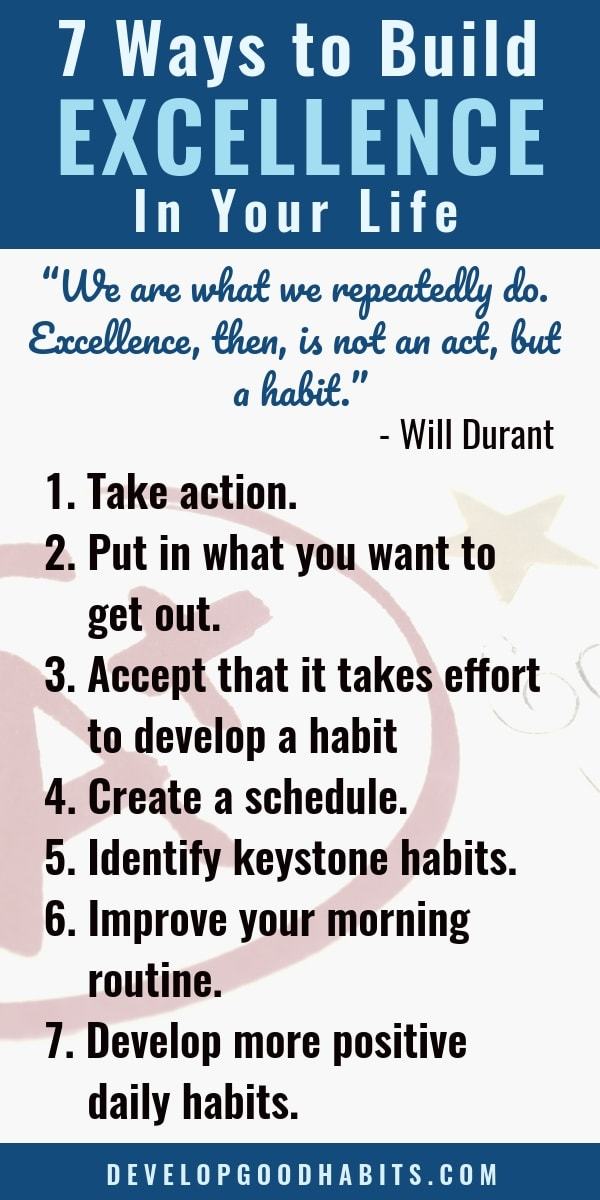You Are What You Continually Do
There might be affiliate links on this page, which means we get a small commission of anything you buy. As an Amazon Associate we earn from qualifying purchases. Please do your own research before making any online purchase.
Have you ever heard this famous quote that's often attributed to Aristotle:
"We are what we repeatedly do. Excellence, then, is not an act, but a habit."
Or, put more simply: "Excellence is a habit."
Over the past two decades, the world of personal growth and development has seemed to grow exponentially. The Internet, technological advancements, and easier access to personal development resources have all contributed to this. We can now instantly share information with other parts of the world, whereas it used to take months.
But personal development has been around for thousands of years. When a simple statement such as this one remains alive for centuries, it is a good idea to stop and recognize its truth. Take a minute to really understand the power and truth behind these words.
This article will briefly explore this Aristotle quote, why it should be a guiding principle to building your best life, and seven lessons you can learn about installing excellence as a habit.
Let's get to it…
What You Will Learn
- The Real Story Behind the "Excellence as a Habit" Quote:
- 7 Lessons for Building Excellence In Your Life
- 1. Take action.
- 2. Put in what you want to get out.
- 3. It gets easier.
- 4. Create a schedule.
- 5. Identify keystone habits.
- 6. Improve your morning routine.
- 7. Develop more positive daily habits.
- Excellence is possible in all areas of your life.
The Real Story Behind the "Excellence as a Habit" Quote:
This famous quote is usually attributed to Aristotle. But authors Caelan Huntress and Frank Herron discovered that the real origin of this quote is Will Durant, who was trying to explain Aristotle's contribution to philosophy in simple terms.
Aristotle's original quote was:
"As it is not one swallow or a fine day that makes a spring, so it is not one day or a short time that makes a man blessed and happy."
The shorter, more popular version of this Aristotle quote has become a guideline for many people who are seeking excellence and success in their lives. The implication of this quote is that it doesn't matter what people do on occasion or from time to time. In order to achieve excellence, an action must be done repeatedly to the point that it can be considered a habit.
Further, successful people have been able to isolate the word "do" from the more popular version of this quote. This suggests that excellence involves action, not just promises or things people hope to accomplish.
For example, rather than just projecting confidence, people who achieve excellence are competent. Rather than procrastinating and pretending to be on top of things, people who achieve excellence are proactive. When excellence is a habit, it manifests itself in everything that you do.
RELATED: Habits that Stick!
Want to build a new habit that will stick for the rest of your lifetime? In this video, you will discover a simple 9-step process about building habits that you can immediately implement.
7 Lessons for Building Excellence In Your Life
Have you ever stopped and thought about your daily routine, and asked yourself why you do some of the same things every day? Have you ever considered that you do the same things in the same order? This is shaped by habit.
A habit isn't something that you do consciously. It's an automatic response to some kind of emotional trigger. We are what we repeatedly do.
What are some of the things that you repeatedly do in your life? Good or bad, these habits shape your life and determine the person you are.
Excellence, like any habit, is a daily commitment, not a one-off task. (Read this post to learn the difference of excellence vs perfection.)
If you pause and try to understand the power of this quote, you'll realize that every goal in your life can be broken down into simple habits that you can build. Start by committing to start.
If you'd like to turn excellence into a habit, here are seven strategies to make this happen:
1. Take action.
You may be able to make it look like you have things under control, but you will not achieve excellence until you take action. You have to do things that are in conjunction with your goals, and act alongside your consistent motivation to be excellent.
For example, if your goal is to get in shape, simply joining a gym is not going to lead you to excellence. You have to commit to actually going each day, and carve out time in your schedule to dedicate exclusively to exercising. (To learn how to do this, read this article on the 21-minute habit to plan out your day.)
2. Put in what you want to get out.
Your life will only be as great as the work you put into it. If you don't put in a lot of work or effort, you won't get much in return. This means that you have to stick with your excellence habits in order for them to give you a good return on your investment. If you put in minimal effort, excellence will be out of reach. But remember to put in deliberate effort. Prioritize quality over quantity.
Continuing with the example of getting in shape, you have to be dedicated to spending the necessary time and energy in order to get the results that you want to achieve. If you only spend 5 or 10 minutes a day, you won't see the long-term results that you're likely hoping for.
3. It gets easier.
It takes effort to develop a habit, especially a healthy habit that will not result in immediate benefits or results. But, the more you work on it, the easier it will become. Eventually, your positive actions will become second nature to you, and you will do them without even thinking about it. This is when the action has become a habit.

4. Create a schedule.
Schedule important habits into your day using an app like Todoist. Learn how to use Todoist to manage your to-do lists, break down big projects into smaller tasks, record ideas, collaborate with co-workers, and rank your priorities. By using an app like Todoist, you can schedule your new habits into your day to make them become a part of your new normal.
5. Identify keystone habits.
Your keystone habits are those that lead to more positive habits. To live a life of excellence, you want to identify keystone habits that can transform your health, wealth, and relationships, and then do these habits every day.
For example, let's say you want to develop a keystone habit of putting money into a savings account. Doing this on a regular basis may then lead you to be more money-conscious in your daily life. As you're actively saving money, you may start to think twice before stopping to pick up a cup of coffee on the way to work, and instead choose to make coffee at home, which will help save money.
Money saving apps, for example, might be your key to budgeting and saving on a regular basis. When you are able to incorporate actions into your everyday life it becomes easy to make good decisions. (To learn more about this topic, here are 26 money habits you should develop.)
6. Improve your morning routine.
If you start your good habits in the morning, you will be more likely to continue your day on a positive path. People are the most productive as soon as they wake up, and creating a morning routine will help guarantee that you maintain that level of productivity throughout the day.
To be excellent, it is a good idea to review your short- and long-term goals every morning.
Start by looking at what you need to do for the day and deciding the most efficient order of business for your tasks. Then, look at your long-term goals and identify the things that you will be doing during the day that will be getting you closer to reaching those goals.
You can set goals for the day or for several years ahead, but you will not make any progress if you aimlessly wander around. You have to use every moment of time to your advantage.

7. Develop more positive daily habits.
If you get stuck with what to do, read these posts on 203 good habits you can build. Not only can these habits inspire and motivate you to be your best self, they can also encourage you to make more positive changes in your life. Making a lot of small changes by adding these suggested habits to your day can add up to a big change.
Even doing small things like talking to other people who you believe are excellent (like a prospective mentor) or taking the time to stretch and do some deep breathing can add up to a lot more than it may seem. See how many of these habits you already do, and which ones you may be able to add to your life.
Excellence is possible in all areas of your life.
The big lesson here:
Excellence is possible in all areas of your life.
The trick to achieving excellence is to identify what you need to do and schedule it into your day on a regular basis so it becomes a habit. More importantly, make sure you never miss a day!
Sure, everyone needs to take appropriate breaks for their mental and physical health, but don't just sit around and let time pass you by, waiting for excellence to come to you. You have to actively go out there and pursue it in order to make excellence a defining factor in your life.
We talked a lot about habits in this article. So if you'd like to see additional content on this subject, here are a few articles you can check out:
- 8 Steps to Form a New Habit
- 51 Habits to Add to Your Morning Routine
- 13 Steps to Build a Habit Stacking Routine
- 29 Best Books on Building Good Habits
- 129 30-Day Challenge Ideas for Building a New Habit
- 13 Free Habit Tracker Templates to Download & Print
Finally, if you need help with building habits, then check out this nine-step blueprint that walks you through the entire process of creating lifelong habits.)


Source: https://www.developgoodhabits.com/excellence-habit/
0 Response to "You Are What You Continually Do"
Post a Comment